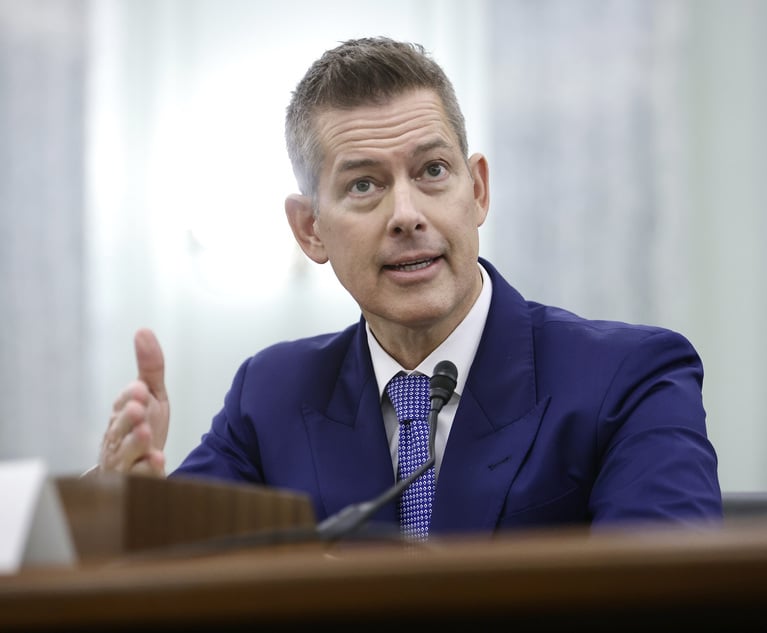AT&T GC Says Choosing ADR Over Court Has Become 'Overriding Philosophy'
The International Institute for Conflict Prevention & Resolution recently named AT&T Inc. and senior executive vice president and general…
August 15, 2017 at 07:35 PM
5 minute read
The original version of this story was published on Law.com
The International Institute for Conflict Prevention & Resolution recently named AT&T Inc. and senior executive vice president and general counsel David McAtee II the recipients of its 2017 Corporate Leadership Award for leadership in dispute resolution.
For a massive company like AT&T, conflict resolution rather than litigation to resolve a dispute is an “overriding philosophy” that benefits the business and its customers, McAtee said in an interview with Corporate Counsel. For the legal department, he explained, this approach requires balancing this preference for alternative dispute resolution with judgment on when a dispute simply needs to be fought out in court.
AT&T's legal department has for years followed the approach that favors ADR over litigation in court, McAtee said. “When you think about the size of what we do and the scope of what we do … over time, it's just become an overriding philosophy that really makes sense for us,” he said. “So much of our business is about avoiding friction, getting to the right result with less friction. That's what ADR provides to us.”
If there's an issue with a business customer, for example, ADR enables the company to get to the bottom of a problem as quickly as possible while avoiding certain additional variables, according to McAtee. “By allowing us to focus on the solution, ADR allows us to bypass a number of costly things [such as litigation expenses] that might sidetrack us,” he said.
And for contracts with wireless customers, McAtee said the company's arbitration clause is similarly designed to “give us every incentive to get right to the heart of the problem.”
This clause, McAtee explained, stipulates that if a wireless customer has a problem, they can inform the company, which will attempt to resolve the issue within 30 days of receiving notice. A customer who is unhappy with a settlement offer may then start an arbitration proceeding. If AT&T is deemed to have offered an inadequate settlement, the customer gets the arbitrator's award or $10,000—whichever is greater. AT&T pays any expert witness fees and costs and pays double the amount of attorney fees.
AT&T's legal team of more than 500 attorneys, who are spread across 20 countries, is heavily involved in AT&T's ADR processes from start to finish, McAtee said. For instance, the idea of incorporating consumer-friendly arbitration agreements into wireless contracts with consumers was “a lawyer-driven effort,” he explained. And with business-to-business agreements, the legal department had a heavy hand in ensuring that a dispute resolution process was built into contracts that would allow both parties to continue doing business while an issue is resolved, he added.
“We really have lawyers who work day-to-day, shoulder-to-shoulder with their business clients,” McAtee said. “You only can accomplish that when you've got great trust between the client and the lawyer that's developed through the years of working together in the trenches.”
Despite a preference for ADR to resolve conflicts, McAtee said the legal department “won't hesitate” to fight a matter in court. Striking the right balance, he said, is something “I keep my eye on quite a bit.”
“It's important that I and members on my team put a marker down that if there's a fight that needs to be fought in court, we're not afraid to fight it,” he said. “So we've made very strategic decisions in the past to go to court to make sure that we send the message that we're not afraid to avail ourselves of the court when we think it's appropriate to do so.”
The best example of this is with patent litigation, McAtee offered. A few years ago, it was revealed that AT&T was the top target of nonpracticing entities, often referred to as “patent trolls.” This news reminded McAtee that AT&T needed to make sure to push back against the proliferation of lawsuits against the company, which is why the legal department will carefully choose patent cases to take to trial every year or two.
For all the good that may come from ADR, there has been criticism in recent years of mandatory arbitration provisions, which often prevent consumers from pursuing any type of litigation against a company.
AT&T was thrust into the debate recently when five U.S. senators in a June 7 letter expressed concern about the telecommunications company's use of forced arbitration clauses in customer contracts. AT&T responded on June 30, stating that AT&T's arbitration system is extremely customer-friendly and that because customers freely enter into contracts for service, they are not forced to agree to arbitration.
Speaking generally about these provisions, McAtee said it's “impossible to paint this issue with just one brush” because all are a little bit different. “What we have found is every court that has looked at our provision has upheld it and in many cases, has complimented it,” McAtee said, “and so we always bristle at being lumped in with others.”
This content has been archived. It is available through our partners, LexisNexis® and Bloomberg Law.
To view this content, please continue to their sites.
Not a Lexis Subscriber?
Subscribe Now
Not a Bloomberg Law Subscriber?
Subscribe Now
NOT FOR REPRINT
© 2025 ALM Global, LLC, All Rights Reserved. Request academic re-use from www.copyright.com. All other uses, submit a request to [email protected]. For more information visit Asset & Logo Licensing.
You Might Like
View All


After Botched Landing of United Airlines Boeing 767, Unlikely Plaintiff Sues Carrier
5 minute read
DOT Moves to Roll Back Emissions Rules, Eliminate DEI Programs
Trending Stories
- 1Two More Victims Alleged in New Sean Combs Sex Trafficking Indictment
- 2Jackson Lewis Leaders Discuss Firms Innovator Efforts, From Prompt-a-Thons to Gen AI Pilots
- 3Trump's DOJ Files Lawsuit Seeking to Block $14B Tech Merger
- 4'No Retributive Actions,' Kash Patel Pledges if Confirmed to FBI
- 5A Texas Lawyer Just Rose to the Trump Administration
Who Got The Work
J. Brugh Lower of Gibbons has entered an appearance for industrial equipment supplier Devco Corporation in a pending trademark infringement lawsuit. The suit, accusing the defendant of selling knock-off Graco products, was filed Dec. 18 in New Jersey District Court by Rivkin Radler on behalf of Graco Inc. and Graco Minnesota. The case, assigned to U.S. District Judge Zahid N. Quraishi, is 3:24-cv-11294, Graco Inc. et al v. Devco Corporation.
Who Got The Work
Rebecca Maller-Stein and Kent A. Yalowitz of Arnold & Porter Kaye Scholer have entered their appearances for Hanaco Venture Capital and its executives, Lior Prosor and David Frankel, in a pending securities lawsuit. The action, filed on Dec. 24 in New York Southern District Court by Zell, Aron & Co. on behalf of Goldeneye Advisors, accuses the defendants of negligently and fraudulently managing the plaintiff's $1 million investment. The case, assigned to U.S. District Judge Vernon S. Broderick, is 1:24-cv-09918, Goldeneye Advisors, LLC v. Hanaco Venture Capital, Ltd. et al.
Who Got The Work
Attorneys from A&O Shearman has stepped in as defense counsel for Toronto-Dominion Bank and other defendants in a pending securities class action. The suit, filed Dec. 11 in New York Southern District Court by Bleichmar Fonti & Auld, accuses the defendants of concealing the bank's 'pervasive' deficiencies in regards to its compliance with the Bank Secrecy Act and the quality of its anti-money laundering controls. The case, assigned to U.S. District Judge Arun Subramanian, is 1:24-cv-09445, Gonzalez v. The Toronto-Dominion Bank et al.
Who Got The Work
Crown Castle International, a Pennsylvania company providing shared communications infrastructure, has turned to Luke D. Wolf of Gordon Rees Scully Mansukhani to fend off a pending breach-of-contract lawsuit. The court action, filed Nov. 25 in Michigan Eastern District Court by Hooper Hathaway PC on behalf of The Town Residences LLC, accuses Crown Castle of failing to transfer approximately $30,000 in utility payments from T-Mobile in breach of a roof-top lease and assignment agreement. The case, assigned to U.S. District Judge Susan K. Declercq, is 2:24-cv-13131, The Town Residences LLC v. T-Mobile US, Inc. et al.
Who Got The Work
Wilfred P. Coronato and Daniel M. Schwartz of McCarter & English have stepped in as defense counsel to Electrolux Home Products Inc. in a pending product liability lawsuit. The court action, filed Nov. 26 in New York Eastern District Court by Poulos Lopiccolo PC and Nagel Rice LLP on behalf of David Stern, alleges that the defendant's refrigerators’ drawers and shelving repeatedly break and fall apart within months after purchase. The case, assigned to U.S. District Judge Joan M. Azrack, is 2:24-cv-08204, Stern v. Electrolux Home Products, Inc.
Featured Firms
Law Offices of Gary Martin Hays & Associates, P.C.
(470) 294-1674
Law Offices of Mark E. Salomone
(857) 444-6468
Smith & Hassler
(713) 739-1250






